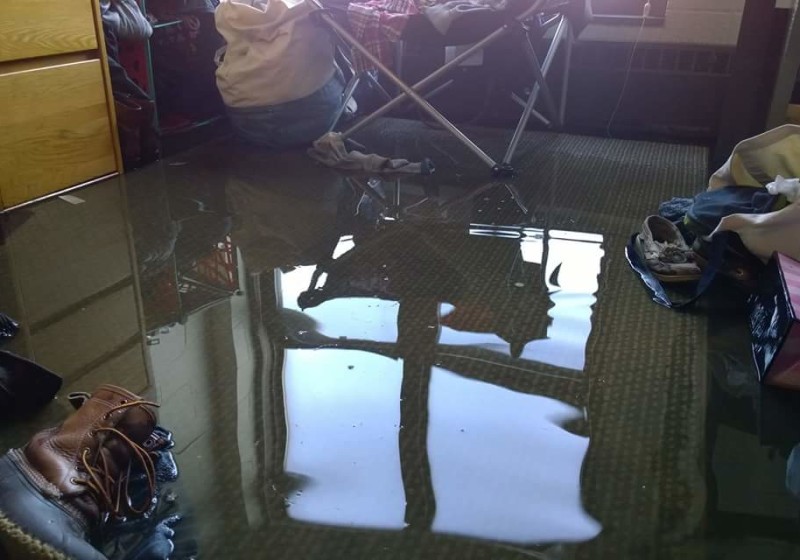“I came back to a disaster,” said Jien Ogawa, a sophomore resident of Gale House. “Everything I had here is destroyed. I don’t know what I’m going to do now.”
Ogawa was just one of approximately 40 Gale residents to see their dorms and property destroyed in a flood Sunday morning, the result of a burst water pipe. The pipe, housed in suite 430 of Gale, burst around 8 a.m. due to the low winter temperatures.
Despite thousands of dollars of damages incurred as a result of the flood, the University decided not to reimburse students, citing a stipulation in its housing contract that absolves the University of liability to damaged or lost property.
The University will only take responsibility for material damages if the losses stem from catastrophic events, such as a widespread fire, said Executive Director of Residential Life and Housing Services Laurel Contomanolis, who responded indirectly to questions posed by a Campus Times reporter.
And many Gale residents are upset with the decision—as well as with the conditions and circumstances of the flood cleanup.
Contomanolis said that students and parents have reached out to facilities, the Department of Public Safety, the Office of Parent and Family Relations, and Residential Life services via phone and email. Some have stopped into the Residential Life office to personally complain.
Many undergraduates received an email last Friday from a supervising Residential Life official, detailing the potential risk cold weather poses to pipes—in particular, that the pipes can freeze and break if windows are left open. Residents of Gale House did not receive any such email.
But affected students say that a warning about freezing pipes would not have been necessary. Dominick Schumacher, the resident community advisor, confirmed that fourth-floor Gale residents had complained of cold lounge temperatures, and that the lounge windows on the fourth floor do not open. Any open window, Schumacher said, would have had to be in one of the bedrooms, around a corner and down a hallway from the lounge. Residents of suite 430 said that no windows nor the balcony door were open.
The water poured through four floors worth of suites, down stairwells, and into the basement. Schumacher noted that water continued to flow into the Gale House lobby from upper floors for nearly 30 minutes after it had been shut off.
Water from the pipe flowed over and through many of the building’s heat sources, warming it. Schumacher said he felt hot water dripping onto his skin when he re-entered the lobby on the first floor. He noted that the water in the lobby was steaming.
Upon returning to her room about thirty minutes after a building-wide evacuation, Ogawa opened the door to her third-floor suite to find half an inch of dark water throughout the lounge and the suite’s hallway. Vapor was drifting out of her lounge heater.
Her room, she said, was “an absolute disaster.”
Three corkboard ceiling panels had partially disintegrated and fallen onto her bed; the walls adjacent to her bed were caked with a grayish smear, and a cloudy puddle had soaked her entire bed set. Ogawa’s suitemate, sophomore Brad Kaufman, described a similar scene upon entering his room, where three ceiling tiles had fallen onto his belongings.
Thomas Rouse, Assistant Director for Residential Life, emailed all affected students soon after the incident, urging them to close their windows, and to do their laundry as soon as possible.
Students were also advised to find an alternate place to stay, though temporary housing would be provided in the Hill Court seminar rooms if they couldn’t find anywhere else to go.
Professional cleaning company Servpro vacuumed the rooms and cleared away broken ceiling tiles throughout Sunday, leaving behind fans that had to be kept running during the night. After, students were told by Residential Life that they could return to their dorms and that it was safe to sleep in their rooms—though they would need to keep doors open.
Leah Schwartz, a resident of suite 430, said she was uncomfortable with leaving all of her suite doors open with loud fans blowing in the room. “I didn’t want people walking into our suite,” she said.
Schumacher said about five to 10 of his residents slept in River Campus Libraries in the wake of the flooding. He estimated that five or six of those affected stayed in their dorms on the first night.
Later on Sunday, Residential Life officials told affected students they could return to their dorms without issue.
But issues arose. Schumacher said some of his residents complained of “allergic reactions and very, very bad smells,” as well as “sneezing, coughing, [and] having trouble breathing.” Campus Times reporters who visited an affected suite also noted an unpleasant smell.
Schumacher said that when he tried to knock on dorm doors, residents could not hear him because of the fans. He had to enter suites to speak with them, and was incredulous as to how residents could sleep with the noise.
Some described the way items appeared to have been hastily tossed onto desks and chairs during the cleanup. As well, Schumacher said, most of the affected had told him their spaces were not dry as of Tuesday. To complaining residents, Schumacher relayed a message: “ResLife says it’s being handled.”
On Wednesday, Contomanolis said the condition of the rooms was “excellent.”
Contomanolis also called concerns that mold might grow in affected spaces “impossible,” adding that Servpro used the University’s only official mold remover, Vanquish.
In Ogawa and Kaufman’s suite, Kaufman lost his laptop, printer, extension cord, rental textbook, and dress shoes that had been underneath a bag of damp tiles left behind by Servpro. Ogawa lost her Nintendo 3DS, the chair onto which her damp clothes had been piled, and her bedsheets. Kaufman estimated his total losses to be about 2,000 dollars—Ogawa less, near 1,000 dollars.
An effort is being made by the Students Association (SA) Government to catalog the damages incurred by Gale residents. The effort, spearheaded by sophomore Anmol Almast and junior Tristan Ford, is still in an early stage, and SA President Grant Dever has encouraged affected students to reach out to their parents and school administrators in the meantime.
“I don’t know how I’m going to pay for it,” Ogawa said. “I talked to my dad, but I’m still not sure.”
Editor-in-Chief Aurek Ransom and Managing Editor Justin Trombly contributed to this piece.





